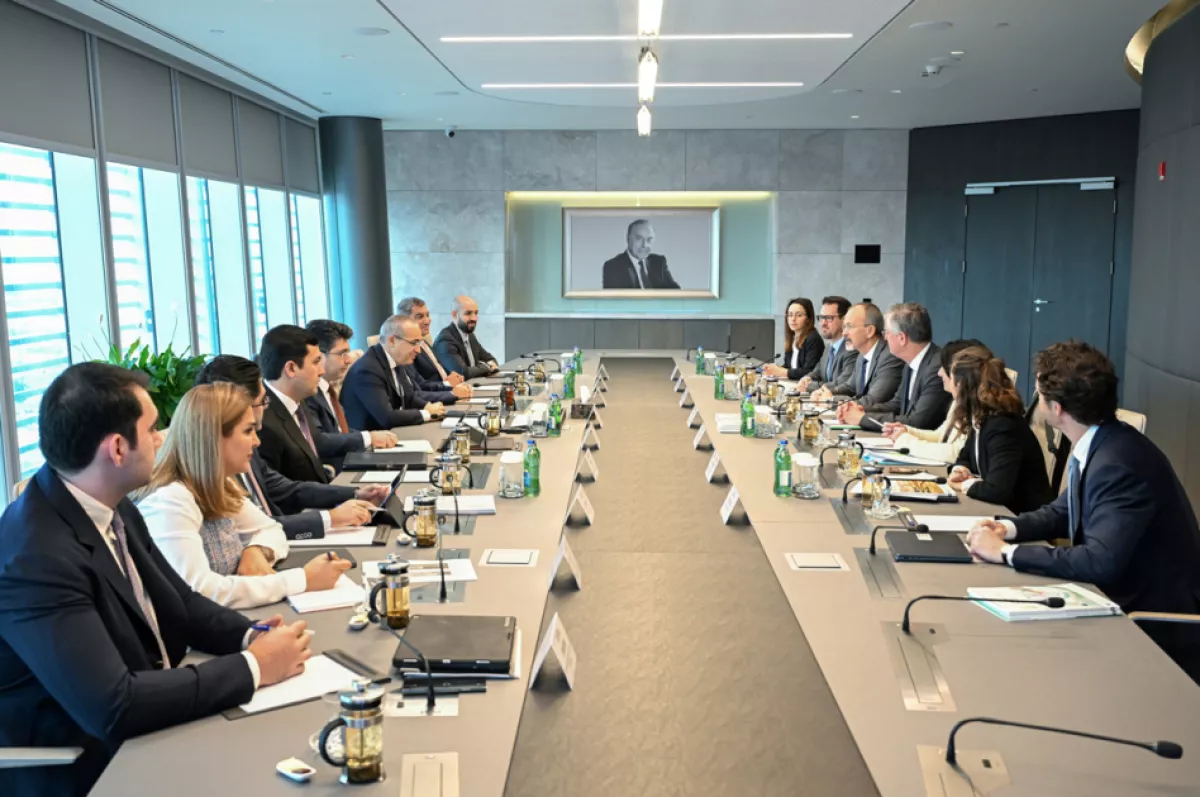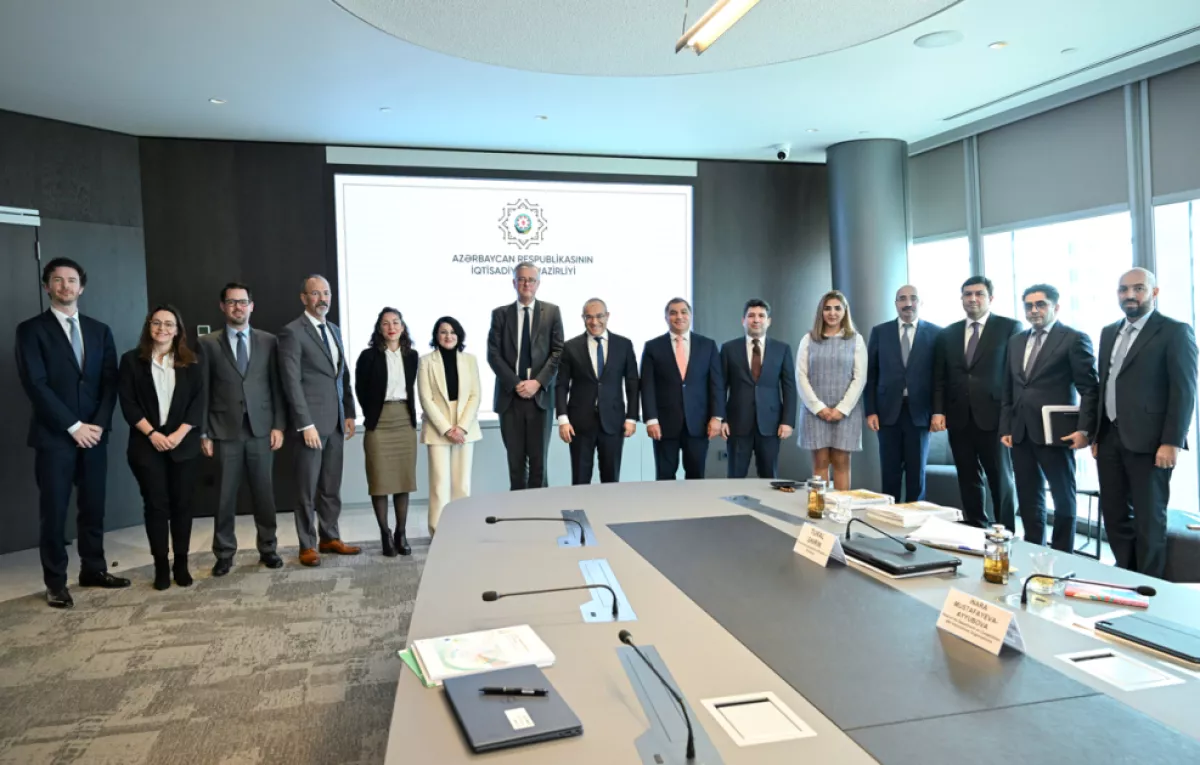Azerbaijan's strategic partnership with OECD A vision for future cooperation
Diversifying the non-oil economy within the framework of Fourth Industrial Revolution (4IR) trends and its swift integration into the global economic system is a key priority of Azerbaijan’s ongoing reforms. Achieving this goal involves incorporating "green" and IT technologies into business processes, enhancing tax transparency, adopting corporate governance principles in large state-owned companies, and supporting small and medium-sized enterprises (SMEs).
These strategic directions are a focal point for the Ministry of Economy of Azerbaijan, which actively collaborates with international organizations, including the Organisation for Economic Co-operation and Development (OECD), on these issues. Recently, an OECD delegation visited Baku to discuss partnership prospects with the Ministry of Economy.
The Organisation for Economic Co-operation and Development (OECD) was established in 1948 to coordinate post-war economic reconstruction projects in Europe under the Marshall Plan. Headquartered in Paris, the organization initially focused exclusively on the European region. However, starting in the 1960s, the OECD expanded its membership and geographical scope. Today, it includes 38 member states with advanced free-market economies, spanning Asia, North and South America, Oceania, the Middle East, and beyond.
The OECD has long been recognized as one of the world’s leading organizations, renowned for its effective expertise in economic analysis, forecasting, and governance solutions across nearly all sectors of economic and social activity. Its experts conduct extensive analytical work in areas such as trade, investment, corporate governance, business climate improvement, and public administration efficiency. Other priorities include integrating green and IT technologies into economies, managing pension systems and education, and implementing environmental initiatives.
The organization’s specialists have accumulated extensive experience in these fields, developing tested, ready-to-use solutions. Through country-specific analysis and consulting expertise, the OECD creates best practices tailored for partner countries—optimal solutions designed to deliver maximum results with minimal costs.
Azerbaijan has been steadily expanding its partnership with the OECD for many years. Numerous joint projects have been implemented, providing the country with consulting and expert support. Today, the agenda of Azerbaijan's cooperation with the OECD includes some of the most pressing issues: diversifying and digitizing the non-oil economy, adopting best practices for the development of SMEs, enhancing transparency and accountability in the tax sector, strengthening collaboration under the Eurasia Competitiveness Programme, and jointly implementing other innovative projects.
These and other issues were discussed during a recent meeting between Azerbaijan's Minister of Economy, Mikayil Jabbarov, and a delegation led by Charles Donald, Chair of the OECD Working Party on State Ownership and Privatisation Practices and CEO of the UK Government Investments. The meeting highlighted the successful partnership with the OECD, underscored the importance of joint efforts across various sectors, and provided updates on measures taken to diversify Azerbaijan's economy, reduce state involvement in state-owned enterprises, enhance economic efficiency, and strengthen financial resilience.
"Our discussions focused on the projects implemented in collaboration with the OECD, as well as the priority issues concerning the sustainable operation of the Azerbaijan Investment Holding and its portfolio companies, and their management in alignment with corporate governance principles," Minister Jabbarov wrote on his social media account.

OECD representatives expressed satisfaction with the implementation of joint projects with Azerbaijan and shared insights on the principles of effective market management for state-owned enterprises in OECD member countries.

Over the years, the OECD has acted as a consultant and provided technical assistance within EU-funded projects in Azerbaijan. These initiatives have primarily aimed at enhancing competitiveness and fostering innovation among SMEs. The main beneficiary of these projects has been the Small and Medium Business Development Agency (KOBİA) under the Ministry of Economy, which collaborates with the OECD as part of the "Supporting Digitalisation of Small and Medium Enterprises" project.
According to OECD experts, the concept of economic digitalization, including in the SME segment, involves the comprehensive digitization of B2B and B2G processes, the complete transition to electronic document management, and the automation of fiscal and other reporting by organizations to the state. Corporate relations and procedures, such as deal-making, fundraising, and notarial operations, are increasingly being digitized. Moreover, the buying and selling of goods and services predominantly take place online, reflecting a broader shift toward electronic formats.
Cooperation is also expanding in the "green" sector. Recently, as part of the UN Conference — COP29, the Ministry of Science and Education of Azerbaijan signed an agreement with the OECD to enhance environmental literacy. Together, they will develop a framework document and educational materials to assess the climate literacy of schoolchildren.
However, the most significant outcomes of joint efforts have been achieved in the modernization of Azerbaijan's fiscal sector. In November, in the ranking of the Global Forum on Transparency and Exchange of Information for Tax Purposes, Azerbaijan was recognized as one of the 18 countries worldwide that fully complies with international standards on tax information exchange and transparency.
"Only eighteen tax administrations worldwide have received the highest rating, four of which were added after the criteria for assessment were tightened in 2019. Azerbaijan was one of these four countries," noted Samira Musayeva, Deputy Head of the State Tax Service (STS).
The Global Forum was mandated by the G20 to monitor and assess the implementation of OECD standards, as well as to assist developing countries. As part of these efforts, the OECD awarded Azerbaijan the highest rating of "compliant," reflecting the high level of transparency in the country's tax system and its adherence to international standards.
Since joining the Global Forum on Transparency and Exchange of Information for Tax Purposes in 2013, Azerbaijan has actively participated in the evaluation processes. In the latest evaluation phase, covering 2016–2024, the country demonstrated a high level of transparency in information exchange, which was confirmed through a visit by the Forum's experts and an analysis of the legal framework, practices for company registration, tax declaration submission, and the storage of accounting documentation.








